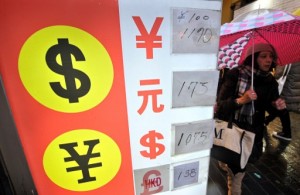
This photo taken on February 1, 2013, shows a woman walking past a currency exchange sign at a shopping district in Seoul. A surging won and waning yen are eroding the bottom lines of South Korea’s export powerhouses, which are feeling the pinch after years of gobbling up global market share from their Japanese rivals. AFP PHOTO/JUNG YEON-JE
SEOUL—A surging won and waning yen are eroding the bottom lines of South Korea’s export powerhouses, which are feeling the pinch after years of gobbling up global market share from their Japanese rivals.
The South Korean currency has soared 27 percent against the yen since the beginning of 2012, as anticipation of monetary easing promised by Japan’s new leader Shinzo Abe weakened the yen across the board.
And the won gained 8.6 percent against the US dollar over the same period, touching a 17-month high of 1,054.49 on January 15. In contrast, the yen slumped this week to its weakest level against the greenback.
The trend is being watched anxiously in business circles in South Korea, where overseas sales account for nearly half of the country’s export-reliant economy.
In the past decade South Korea has made sizable inroads into Japan’s export market where the two countries compete head-to-head in the electronics, auto, shipping and steel product sectors.
While only 20 percent of their top 50 export products overlapped in 2000, the figure now stands at more than 50 percent, according to data from the state-run Korea Trade-Investment Promotion Agency.
“The impact of the weak yen will have a limited impact on IT industries like smartphones where South Korea has a wide lead,” said Shin Hyon-Soo of the Korea Institute for Industrial Economics and Trade.
“But industries like auto, home appliances and steel, where slight currency swings play a pivotal role, face a pretty tough road ahead from now on,” Shin said.
Industry giants like Samsung, the world’s biggest technology firm, and the nation’s top automaker Hyundai are already feeling the squeeze, as reflected in their recent fourth quarter earnings reports.
Hyundai Motor, the world’s No. 5 automaker with its smaller affiliate Kia, saw its fourth-quarter operating profit tumble nearly 12 percent from a year ago despite an 11-percent increase in sales.
Japanese rivals like Toyota and Honda are set to “actively take advantage of the weakening yen” in competitive markets like Australia and Russia, Hyundai’s chief financial officer warned last week.
Stronger won partly to blame
Kia said the stronger won was partly to blame for a 51 percent plunge in its fourth-quarter operating profit from a year earlier.
“We are considering raising export prices of our vehicles if the strong won persists,” Kia chief financial officer Park Han-Woo said, while speaking of a “difficult year” ahead.
Even the country’s flagship conglomerate, Samsung, is not immune.
The world’s top maker of smartphones, memory chips and flat-panel TVs reported a record operating profit of 8.84 trillion won in the fourth quarter, but said the figure would have been higher by 360 billion won but for the strength of the currency.
It also warned that a stronger won could slice 3.0 trillion won off its operating profit this year—a prediction that pushed Samsung’s share price to a two-month low on the day of its stellar earnings announcement.
Although Samsung enjoys a formidable advantage in the mobile device market over long-struggling Japanese giants like Sony and Sharp, its memory chip business is more vulnerable.
“The weak yen won’t overly impact on Samsung’s phone sales for a while, but the semiconductor segment is a different story,” said an industry source in Seoul who declined to be named.
The source said it would be “problematic” if the yen remained weak against the dollar in the long term.
Samsung’s smaller rival LG reported a fourth-quarter net loss of 467.8 billion won—four times the deficit it posted the year before.
LG said its sales, which fell 2.3 percent to 13.5 trillion won, were expected to slip further.
“The first quarter is a low season for TV sales and we will also face the impact of the strong won,” LG chief financial officer Jung Do-Hyun said on Wednesday.

